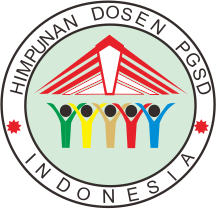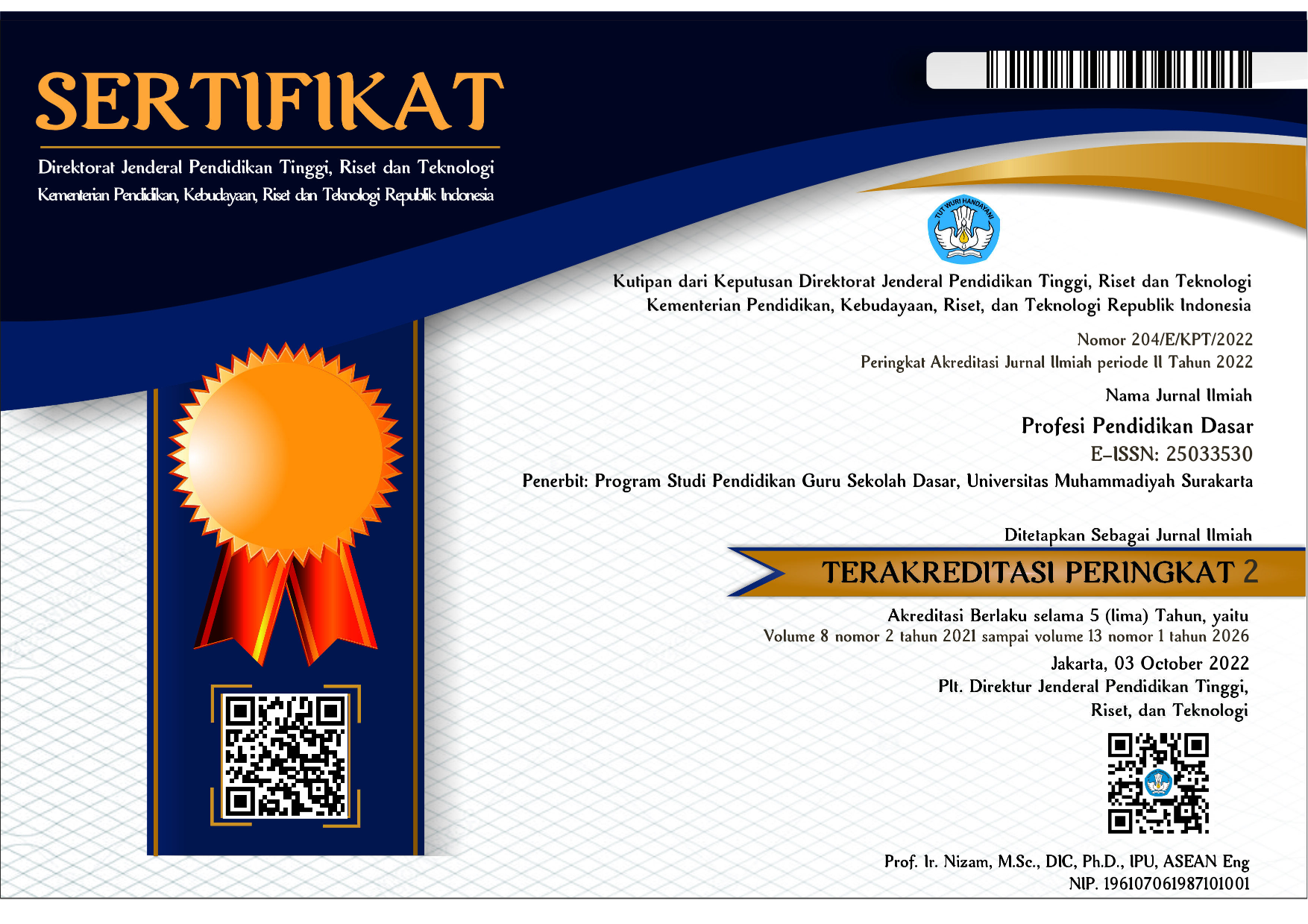Science Literacy in Elementary Schools: A Comparative Study of Flipped Learning and Hybrid Learning Models
Hamna Hamna(1*), Muh. Khaerul Ummah BK(2)(1) Universitas Madako Tolitoli, Central Sulawesi, Indonesia
(2) Universitas Madako Tolitoli, Central Sulawesi, Indonesia
(*) Corresponding Author
Abstract
Keywords
Full Text:
PDFReferences
Abroto, A., Maemonah, M., & Ayu, N. P. (2021). Pengaruh Metode Blanded Learning dalam Meningkatkan Motivasi dan Hasil Belajar Siswa Sekolah Dasar. EDUKATIF: Jurnal Ilmu Pendidikan, 3(5), 1993–2000. https://doi.org/https://doi.org/10.31004/edukatif.v3i5.703
Alrashed, Y., & Bin, I. A. (2021). Flipped Learning in Science Education: Implications and Challenges. Psychology and Education Journal, 58(1), 5697–5707. https://doi.org/https://doi.org/10.17762/pae.v58i1.1973
Assidiqia, M. H., & Sumarni, W. (2020). Pemanfaatan Platform Digital di Masa Pandemi Covid-19. Seminar Nasional Pascasarjana Universitas Negeri Semarang, 298–202. https://proceeding.unnes.ac.id/index.php/snpasca/article/download/601/519
Azimi, Rusilowati, A., & Sulhadi. (2017). Pengembangan Media Pembelajaran IPA Berbasis Literasi Sains untuk Siswa Sekolah Dasar. PSEJ: Pancasakti Science Education Journa, 2(2), 145–157. http://e-journal.ups.ac.id/index.php/psej
Bishop, J., & Verleger, M. A. (2013). The flipped classroom: A survey of the research. 23.1200.1-23.1200.18. https://peer.asee.org/the-flipped-classroom-a-survey-of-the-research
Chen, W., Niu, Z., Zhao, X., & Li, Y. (2014). A Hybrid Recommendation Algorithm Adapted in E-Learning Environments. World Wide Web, 271–284. https://doi.org/https://doi.org/10.1007/s11280-012-0187-z
Cheng, L., Ritzhaupt, A. D., & Antonenko, P. (2019). Efects of the Fipped Classroom Instructional Strategy on Students’ Learning Outcomes: A Meta-Analysis. Education Tech Research Dev, 793–824. https://doi.org/https://doi.org/10.1007/s11423-018-9633-7
Dewi, W. A. F. (2020). Dampak Covid-19 Terhadap Implementasi Pembelajaran Daring di Sekolah Dasar. EDUKATIF: Jurnal Ilmu Pendidikan, 2(1), 55–61. https://edukatif.org/index.php/edukatif/article/view/89
Effendi, D., & Wahidy, A. (2019). Pemanfaatan Teknologi dalam Proses Pembelajaran Menuju Pembelajaran Abad 21. Prosiding Seminar Nasional Pendidikan Program Pascasarjana Universitas PGRI Palembang, 125–129. https://jurnal.univpgri-palembang.ac.id/index.php/Prosidingpps/article/download/2977/279
Fausan, M. M., Susilo, H., Gofur, A., Sueb, S., & Yusop, F. D. (2021). The Scientific Literacy Performance of Gifted Young Scientist Candidates in the Digital Age. Cakrawala Pendidikan: Jurnal Ilmiah Pendidikan, 40(2), 467–479. https://doi.org/doi:10.21831/cp.v40i2.39434
Gumilar, E. B. (2021). Penerapan Flipped Classroom Terhadap Kemampuan Pemahaman Konsep dan Pemecahan Masalah Matematis pada Mahasiswa STAI Muhammadiyah Blora. Jornal Ilmiah Peadagogy, 14(2), 56–67. http://jurnal.staimuhblora.ac.id/index.php/pedagogy/article/view/95/87
Hamna, & Ummah BK, M. K. U. (2022). Dilematism: Principal’s Managerial Strategies in Realizing the Covid-19 Vaccination Program in Elementary School. Jurnal Madako Education, 8(1), 70–79. https://ojs.umada.ac.id/index.php/jme/article/view/214/201
Hendrayati, H., & Pamungkas, B. (2016). Implementasi Model Hybrid Learning pada Proses Pembelajaran Mata Kuliah Statistika II di Prodi Manajemen FPEB UPI. Jurnal Penelitian Pendidikan, 181–184. https://ejournal.upi.edu/index.php/JER/article/download/3430/2422
Herreid, F., & Schiller, N. A. (2013). Case Studies and the Flipped Classroom. Journal of College Science Teaching, 62–66. https://www.academia.edu/27180689/Case_Studies_and_the_Flipped_Classroom
Indarta, Y., Ambiyar, A., Samala, A. D., & Watrianthos, R. (2022). Metaverse: Tantangan dan Peluang dalam Pendidikan. Jurnal BASICEDU: Journal of Elementary Education, 6(3), 3351–3363. https://doi.org/https://doi.org/10.31004/basicedu.v6i3.2615
Juniantari, M., Pujawan, I. G. N., & Widhiasih, I. D. A. G. (2018). Pengaruh Pendekatan Flipped Classroom Terhadap Pemahaman Konsep Matematika Siswa SMA. Journal of Education Technology, 2(4), 197–204. https://ejournal.undiksha.ac.id/index.php/JET/article/view/17855/10693
Khofifah, L., Supriadi, N., & Syazali, M. (2021). Model Flipped Classroom dan Discovery Learning terhadap Kemampuan Pemahaman Konsep dan Pemecahan Masalah Matematis. Jurnal PRISMA, 10(1), 17–29. https://jurnal.unsur.ac.id/prisma/article/view/1098
Komariah, A. (2021). Disrupsi Inovasi Manajemen Layanan Sekolah. Prosiding Seminar Nasional Pendidikan Program Pascasarjana Universitas PGRI Palembang, 46–51. https://jurnal.univpgri-palembang.ac.id/index.php/Prosidingpps/article/download/5471/4808
Kye, B., Han, N., Kim, E., Park, Y., & Jo, S. (2021). Educational Applications of Metaverse: Possibilities and Limitations. Jeehp: Journal of Educational Evaluation for Health Professions, 1–13. https://doi.org/https://doi.org/10.3352/jeehp.2021.18.32
Leo, J., & Puzio, K. (2016). Flipped Instruction in a High School Science Classroom. Journal of Science Education and Technology, 775–781. https://doi.org/https://doi.org/10.1007/s10956-016-9634-4
Makhin, M. (2021). Hybrid Learning Model Pembelajaran pada Masa Pandemi di SD Negeri Bungurasih Waru Sidoarjo. MUDIR: Jurnal Manajemen Pendidikan, 3(2), 95–103. https://doi.org/https://doi.org/10.55352/mudir.v3i2.312
Mendikbud. (2020). Surat Edaran Menteri Pendidikan dan Kebudayaan Nomor 4 Tahun 2020 Tentang Pelaksanaan Kebijakan Pendidikan dalam Masa Darurat Penyebaran Coronavvvvirus Disease (Covid-19). Dokumen Menteri Pendidikan Dan Kebudayaan, 1–3. https://covid19.hukumonline.com/wp-content/uploads/2020/04/surat_edaran_menteri_pendidikan_dan_kebudayaan_nomor_4_tahun_2020-2.pdf
Mendikbudristek. (2021). Pengaturan Pembelajaran Tatap Muka (PTM) Terbatas (Nomor 05/KB/2021; Nomor 1347 Tahun 2021; Nomor HK.01.08/MENKES/6678/2021; Nomor 443-5847 Tahun 2021). SKB Empat Menteri, 1–8. https://www.kemdikbud.go.id/main/files/download/e8cf2963a038aa3
Mu’ah, M., Suyanto, U. Y., Romadhona, D., Hidayati, N., & Askhar, B. M. (2020). Pemanfaatan Aplikasi Digital dalam Pembelajaran Interaktif bagi Siswa Sekolah Dasar di Era New Normal. Jurnal Pengabdian Masyarakat Manage, 1(2), 122–128. https://doi.org/https://doi.org/10.32528/jpmm.v1i2.3986
Nastiti, F. E., & ‘Abdu, A. R. N. (2020). Kesiapan Pendidikan Indonesia Menghadapi Era Society 5.0. Edcomtech: Jurnal Kajian Teknologi Pendidikan, 5(1), 61–66. http://journal2.um.ac.id/index.php/edcomtech/article/view/9138/pdf
Novita, L., Sukmanasa, E., & Pratama, M. Y. (2019). Penggunaan Media Pembelajaran Video Terhadap Hasil Belajar Siswa SD. IJPE (Indonesian Journal of Primary Education), 3(2), 64–72. https://ejournal.upi.edu/index.php/IJPE/article/view/22103/10859
Núñez, J. A. L., Belmonte, J. L., Guerrero, A. J., & Sánchez, S. P. (2020). Effectiveness of Innovate Educational Practices with Flipped Learning and Remote Sensing in Earth and Environmental Sciences—An Exploratory Case Study. Remote Sensing, 897(12), 1–14. https://doi.org/https://doi.org/10.3390/rs12050897
Nurfallah, M., & Pradipta, T. R. (2021). Motivasi Belajar Matematika Siswa Sekolah Menengah Selama Pembelajaran Daring di Masa Pandemi COVID-19. Jurnal Cendekia: Jurnal Pendidikan Matematika, 5(3), 2425–2437. https://doi.org/https://doi.org/10.31004/cendekia.v5i3.752
Oakes, D., Joubert, M., & Lyakhova, S. (2019). Exploring Teachers’ Use of Time Gained Due to the Use of A Flipped Classroom Approach in Mathematics. Proceedings of the British Society for Research into Learning Mathematics, 1–6. https://bsrlm.org.uk/wp-content/uploads/2019/09/BSRLM-CP-39-2-10.pdf
OECD. (2018). PISA 2018 Results: Whats Student Know and Can Do.
OECD Publishing. https://doi.org/https://doi.org/10.1787/19963777
Rohmatulloh, R., & Nindiasari, H. (2022). Meningkatkan Kemampuan Pemecahan Masalah Matematis Melalui Model Pembelajaran Flipped Classroom. EDUKATIF: Jurnal Ilmu Pendidikan, 4(1), 436–442. https://edukatif.org/index.php/edukatif/article/view/1877/pdf
Sadler, T. D., & Zeidler, D. L. (2009). Scientific Literacy, PISA, and Socioscientific Discourse: Assessment for Progressive Aims of Science Education. Journal of Research in Science Teaching, 46(8), 909–921. https://doi.org/https://doi.org/10.1002/tea.20327
Salsabila, U. H., Sari, L. I., Lathif, K. H., Lestari, A. P., & Ayuning, A. (2020). Peran Teknologi dalam Pembelajaran di Masa Pandemi Covid-19. Al-Mutharahah: Jurnal Penelitian Dan Kajian Sosial Keagamaan, 17(2), 188–198. https://doi.org/10.46781/al-mutharahah.v17i2.138
Setiawan, B., & Iasha, V. (2020). Covid-19 Pandemic: The Influence of Full-Online Learning for Elementary School in Rural Areas. Jurnal Pendidikan Sekolah Dasar (JPsd), 6(2), 114–123. https://doi.org/http://dx.doi.org/10.30870/jpsd.v6i2.8400.g5942
Sezer, B. (2016). The Effectiveness of a Technology-Enhanced Flipped Science Classroom. Journal of Educational Computing Research, 4(55), 1–24. https://doi.org/https://doi.org/10.1177%2F0735633116671325
Shi, Y., Ma, Y., MacLeod, J., & Yang, H. H. (2019). College Students’ Cognitive Learning Outcomes in Fipped Classroom Instruction: A Meta‑Analysis of the Empirical Literature. Journal of Computers in Education, 79–103. https://doi.org/https://doi.org/10.1007/s40692-019-00142-8
Siregar, F. A. (2019). Teknologi Pendidikan dan Pembelajaran Abad 21. Prosiding Seminar Nasional Teknologi Pendidikan Pascasarjana UNIMED, 610–618. http://digilib.unimed.ac.id/38872/3/ATP 70.pdf
Thohir, M., Maarif, S., Rosyid, J., Huda, H., & Ahmadi, A. (2021). From Disruption To Mobilization: Ire Teachers’ Perspectives on Independent Learning Policy. Jurnal Cakrawala Pendidikan, 40(2), 359–373. https://doi.org/10.21831/cp.v40i2.39540
Tolitoli, B. (2021). Intruksi Bupati Tolitoli Tentang Pelaksanaan Pembelajaran Tatap Muka Terbatas di Masa Pandemi Covid-19 pada Satgas Pendidikan di Kabupaten Tolitoli. Dokumen Pemerintah Kabupaten Tolitoli, 1–3. https://www.lidikinvestigasi-ri.com/2021/08/bupati-tolitoli-instruksikan-kadis.html
Ummah BK, M. K., & Hamna. (2021). The Effectiveness of Jigsaw Learning Model by Using Numbered Cards: Strategy for Increasing Mathematics Learning Motivation Students in Elementary School. Pedagogik Journal of Islamic Elementary School, 4(1), 1–18. https://doi.org/https://doi.org/10.24256/pijies.v4i1.1765
Utamajaya, J. N., Manullang, S. O., Mursidi, A., Noviandari, H., & BK, M. K. U. (2020). Investigating the Teaching Models, Strategies and Technological Innovations for Classroom Learning after School Reopening. Palarch’s Journal Of Archaeology Of Egypt/Egyptology, 17(Vol. 17 No. 7 (2020): PalArch’s Journal of Archaeology of Egypt/Egyptology), 13141–13150. https://archives.palarch.nl/index.php/jae/article/view/5063
Verawati, V., & Desprayoga, D. (2019). Solusi Pembelajaran 4.0: Hybrid Learning. Prosiding Seminar Nasional Pendidikan Program Pascasarjana Universitas PGRI Palembang, 1183–1192. https://jurnal.univpgri-palembang.ac.id/index.php/Prosidingpps/article/view/2739
Wendt, J. L., & Rockinson-Szapkiw, A. (2014). The Effect of Online Collaboration on Middle School Student Science Misconceptions as an Aspect of Science Literacy. Journal of Research in Science Teaching, 51(9), 1–16. https://doi.org/https://doi.org/10.1002/tea.21169
Widyaningsih, O. (2020). Penerapan Pembelajaran Online (Dalam Jaringan) di Sekolah Dasar. Trapsila: Jurnal Pendidikan Dasar, 2(2), 50–60. https://journal.uwks.ac.id/index.php/trapsila/article/download/1106/pdf
Article Metrics
Abstract view(s): 1770 time(s)PDF: 1398 time(s)
Refbacks
- There are currently no refbacks.


















